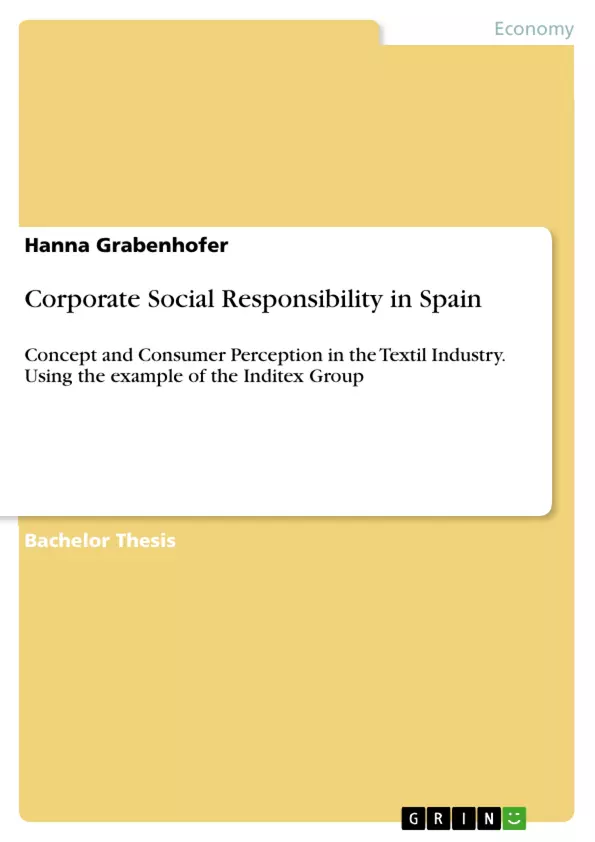Nachhaltigkeit und im Besonderen 'Corporate Social Responsibility' (CSR) gewinnt in den Augen von Konsumenten immer stärker an Relevanz. Unternehmen sind in der Zukunft gefordert nachhaltige Konzepte mit wirtschaftlicher Rendite zu verbinden, um langfristig konkurrenzfähig zu bleiben. Besonders im Textilhandel ist hier Einsatz gefordert, diverse Schreckmeldungen über Produktionsbedingungen haben Konsumenten sensibilisiert.
Die Arbeit besteht aus zwei Themenblöcken.
Zunächst liefert der Autor eine genaue Analyse wissenschaftlicher Literatur zum Thema CSR und verwandten Themengebieten wie 'Corporate Citizenship', 'Corporate Governance', Ethik in der Wirtschaft und nachhaltiges Investment. Auch Theorie zum Thema Konsumentenverhalten im Handel wird vorgestellt.
Darauf folgend wird eine empirische Studie zu Einfluss von CSR und Nachhaltigkeit auf das Konsumentenverhalten in der Spanischen Textilindustrie durchgeführt. Zu diesem Zweck wird eine Kulturanalyse Spaniens vorgenommen, der Modekonzern Inditex als Referenzbeispiel eingeführt und schließlich die Ergebnisse der durchgeführten qualitativen Studie präsentiert.
Inhaltsverzeichnis (Table of Contents)
- Introduction and Aims of Research
- Problem Statement - Purpose
- Research Question
- Research Structure and Content
- Corporate Social Responsibility - An Overview
- Issue and Development
- Theoretical Concepts
- Corporate Social Responsibility - Stakeholder Approach
- Corporate Citizenship
- Corporate Governance
- Sustainable Development
- Socially Responsible Investment (SRI)
- Philanthropy
- Business Ethics
- Measuring and Reporting
- Critics
- Consumer Perceptions
- Corporate Social Responsibility in Spain – A National Dimension
- INDITEX - A Company Profile
- Research and Methodology
- Sample
- Qualitative Interviews
- Data Analysis
- Limitations
- Findings
- Managerial Implications
- Recommendations for further research
- References
- Appendix
Zielsetzung und Themenschwerpunkte (Objectives and Key Themes)
This research aims to explore the perception of Corporate Social Responsibility (CSR) among Spanish consumers, particularly within the textile industry. The paper focuses on the Spanish retailer Inditex Group, examining how their CSR initiatives are perceived and whether they influence consumer purchasing decisions. The study seeks to identify key themes and patterns in Spanish consumer behavior related to CSR, and to contribute to the growing body of research on CSR in the Spanish context. The main objectives and themes explored include:- Understanding the perception of CSR among Spanish consumers
- Analyzing the impact of CSR on consumer buying behavior
- Examining how the Inditex Group's CSR initiatives are perceived by Spanish consumers
- Exploring potential differences in CSR perceptions across gender and age groups in Spain
- Contributing to the development of research on CSR in Spain
Zusammenfassung der Kapitel (Chapter Summaries)
- Chapter 1: Introduction and Aims of Research: This chapter introduces the research topic, highlighting the increasing importance of CSR for businesses and consumers. It also presents the problem statement, research question, and the overall structure of the thesis. The chapter discusses the need for research on CSR in the Spanish context, specifically focusing on the textile industry and the Inditex Group.
- Chapter 2: Corporate Social Responsibility - An Overview: This chapter provides a comprehensive overview of the concept of CSR, exploring its historical development, theoretical underpinnings, and various perspectives. It examines key elements of CSR, including the stakeholder approach, corporate citizenship, corporate governance, sustainable development, socially responsible investment (SRI), philanthropy, and business ethics.
- Chapter 3: Corporate Social Responsibility in Spain – A National Dimension: This chapter examines the specific context of CSR in Spain, highlighting the growing awareness and focus on CSR-related corporate behavior. It discusses the unique challenges and opportunities related to implementing CSR initiatives in Spain, contrasting the Spanish perspective with other European countries.
- Chapter 4: INDITEX - A Company Profile: This chapter provides a detailed overview of the Inditex Group, a prominent Spanish multinational retailer specializing in fashion and apparel. It explores the company's business model, its operations, and its strategic approach to CSR, highlighting key initiatives and practices.
- Chapter 5: Research and Methodology: This chapter outlines the research methodology used in the study. It details the sample selection, the use of qualitative interviews, the data analysis methods, and the limitations of the study.
- Chapter 6: Findings: This chapter presents the findings of the research, analyzing the data collected from interviews with Spanish consumers. It explores general consumer purchasing behavior, perceptions of the Inditex Group and its CSR initiatives, and the influence of CSR on consumer purchasing intentions and decisions.
- Chapter 7: Managerial Implications: This chapter discusses the implications of the research findings for managers and businesses. It offers practical recommendations for how companies can effectively implement CSR initiatives and engage with consumers in a meaningful way.
Schlüsselwörter (Keywords)
This research focuses on corporate social responsibility (CSR), specifically within the context of the Spanish textile industry. The study examines consumer perceptions of CSR, focusing on the Spanish multinational retailer Inditex Group. Key themes explored include consumer behavior, purchasing decisions, sustainable development, stakeholder engagement, and the impact of CSR on brand image and reputation. The study also investigates differences in consumer perceptions across various demographics, including gender and age groups.Frequently Asked Questions
What is the focus of the research on CSR in Spain?
The research explores how Spanish consumers perceive Corporate Social Responsibility (CSR), specifically within the textile industry and the Inditex Group.
Which company serves as the primary case study?
The Inditex Group, a major Spanish multinational retailer known for brands like Zara, is the central reference example for the study.
Does CSR influence the buying behavior of Spanish consumers?
The study analyzes whether sustainability and ethical practices impact purchasing decisions and brand reputation among different demographic groups in Spain.
What theoretical concepts are discussed in the paper?
It covers concepts such as the stakeholder approach, corporate citizenship, corporate governance, business ethics, and socially responsible investment (SRI).
What methodology was used for the Spanish study?
A qualitative research design was used, involving interviews with Spanish consumers to gather in-depth insights into their perceptions and values.
- Quote paper
- Hanna Grabenhofer (Author), 2011, Corporate Social Responsibility in Spain, Munich, GRIN Verlag, https://www.grin.com/document/265446



